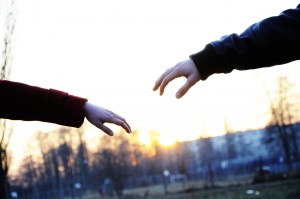Everything changes after the loss of a spouse or partner. For many, this was the person we spent most of our time with. This is who we made our plans with…the one who shared our worries. Every part of our past, present, and future revolved around this person, and to be without them is harder, sadder, and lonelier than we ever could have guessed.

And here’s the thing…not only is it harder than we could have thought; the people we spend time don’t always seem to recognize the depth and duration of this loss. This can be felt any time someone tries to cheer us up, smooth it over, or make it better. Our loved ones are well intentioned, there’s no doubt, but here is what most grievers who have lost a spouse would want those around them to understand:
Continue reading Loss of a Spouse: 5 Things Only a Widow/er Understands →

 It’s not unusual for grievers to feel disconnected from the world around them, but for LGBTQ grief and loss, a lack of resources can result in increased seclusion and isolation.
It’s not unusual for grievers to feel disconnected from the world around them, but for LGBTQ grief and loss, a lack of resources can result in increased seclusion and isolation. In life before loss, however, there is always the sense that tomorrow is another day. That even if we took the wrong path there would always be the chance to set things right.
In life before loss, however, there is always the sense that tomorrow is another day. That even if we took the wrong path there would always be the chance to set things right. Our worlds can become very small after the loss of a loved one. Grief can create blinders that make it hard to see past anything but our own pain and anguish. It can be challenging to get the help we need and to know how to be supportive…in the past we may have turned to friends and family when we’re hurting, but what happens when they’ve also been
Our worlds can become very small after the loss of a loved one. Grief can create blinders that make it hard to see past anything but our own pain and anguish. It can be challenging to get the help we need and to know how to be supportive…in the past we may have turned to friends and family when we’re hurting, but what happens when they’ve also been When I first started facilitating bereavement groups, I sort of assumed that people would be coming for help for “just” one loss. Of course one loss is more than enough…it’s already too much. Yet so many grievers I met were experiencing
When I first started facilitating bereavement groups, I sort of assumed that people would be coming for help for “just” one loss. Of course one loss is more than enough…it’s already too much. Yet so many grievers I met were experiencing 



 There’s no question that the loss of a loved one can be felt in every part of life, but what happens when your loss is hurting your relationship? If you have lost a loved one you know (all too well) the pain, confusion and anger that can come with it. Even if support is strong in the beginning, most grievers will say that typically the consoling fades with time. And it’s one thing to not feel comforted by those we expect it from, but even worse when it feels that the loss is starting to come between us. This can happen in so many ways…a woman who
There’s no question that the loss of a loved one can be felt in every part of life, but what happens when your loss is hurting your relationship? If you have lost a loved one you know (all too well) the pain, confusion and anger that can come with it. Even if support is strong in the beginning, most grievers will say that typically the consoling fades with time. And it’s one thing to not feel comforted by those we expect it from, but even worse when it feels that the loss is starting to come between us. This can happen in so many ways…a woman who